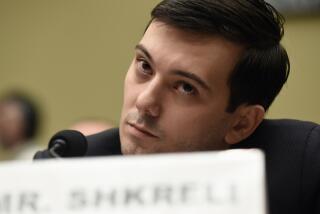Judge Raps Practice of ‘Sampling’ : Pop music: He issues an injunction against a song that uses ‘Alone Again (Naturally).’ Criminal prosecution is possible.
- Share via
The longstanding pop-world debate over the propriety of using “samples” of other people’s music in records has accelerated with a federal judge’s ruling that the practice constitutes theft.
In what is believed to be a first in music copyright cases, Judge Kevin Duffy of the U.S. District Court in New York has referred a case involving a “sample” by rapper Biz Markie of Gilbert O’Sullivan’s 1972 hit “Alone Again (Naturally)” to the U.S. attorney for possible criminal prosecution.
Duffy also issued an injunction Monday stopping Warner Bros. Records from distributing Markie’s recent “I Need a Haircut” album, which contains the song “Alone Again.”
In the case initiated by O’Sullivan, a British singer-songwriter, Duffy also criticized Markie (whose real name is Marcel Hall) and six other defendants, including Warner Bros. Records, for trying to excuse the use of the sample as being a common, innocent practice in the rap world.
“Their only aim was to sell thousands upon thousands of records,” Duffy said, citing evidence that the defendants used the song even after permission had been refused by O’Sullivan.
“They’re going to kill hip-hop music and culture,” Dan Charnas, director of hip-hop A&R; and promotion at Burbank-based Def American Records, said Tuesday. “Hip-hop is not traditional music-making. I don’t think the U.S. legal system or a federal judge (from an older generation) has the cultural capacity to understand this culture and how kids relate to it.”
Charnas said that it’s difficult to apply conventional pop copyright laws to rap because there is artistry in taking the electronic samples of existing works and putting them into new, creative contexts.
But, while still decrying the possible criminal prosecution, he acknowledged that the Markie song was more of a “remake” of the original and not merely use of a snippet. “Biz did a dumb thing by not (getting permission),” he said. “But now you’re going to have a feeding frenzy of lawyers.”
Among the best-known cases of rap hits using identifiable samples are Hammer’s “U Can’t Touch This,” which used the key bass figure from Rick James’ “Super Freak.” Hammer struck a deal with James giving him co-writing credit and 50% of the royalties before releasing his song.
In another case, the rap trio De La Soul was sued by Mark Volman and Howard Kaylan of the Turtles for using a piece of the group’s ‘60s song “You Showed Me” in the 1989 track “Transmitting Live From Mars.” Volman and Kaylan sued for $2.5 million, but reached an out-of-court settlement last year.
Volman greeted the Markie ruling enthusiastically.
“Sampling is just a longer term for theft,” he said. “Anybody who can honestly say sampling is some sort of creativity has never done anything creative. But if somebody wants to acknowledge that they have borrowed or stolen and then pay for it, that’s fine.”
Meanwhile, it appears likely that the music industry will keep a close watch on the outcome of the Markie case. “For the last five years there has been a great deal of confusion on everyone’s part to help foster the rap community, but also come up with an evenhanded way to see to it that copyright owners and musicians and artists are compensated,” said Michael Greene, president of the National Academy of Recording Arts & Sciences. “Some rappers do that religiously, but some don’t. The academy tends to fall on the side of the (songwriters) feeling they are due some consideration for their work, but I understand the independent nature of the rap creators and that sampling is a part of their art.”
More to Read
The biggest entertainment stories
Get our big stories about Hollywood, film, television, music, arts, culture and more right in your inbox as soon as they publish.
You may occasionally receive promotional content from the Los Angeles Times.









